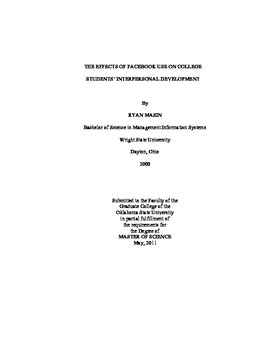| dc.contributor.advisor | Foubert, John | |
| dc.contributor.author | Masin, Ryan | |
| dc.date.accessioned | 2014-04-16T03:11:45Z | |
| dc.date.available | 2014-04-16T03:11:45Z | |
| dc.date.issued | 2011-05-01 | |
| dc.identifier.uri | https://hdl.handle.net/11244/9771 | |
| dc.description.abstract | This is a quantitative study that analyzes Facebook use intensity, sex, and the development of mature interpersonal relationships of students at Oklahoma State University. Correlation analysis yielded small but significant negative relationships between the development of mature interpersonal relationships and Facebook use intensity, with slightly more negative correlations found when only peer relationships were considered. When broken down into females and males, no significant correlations were found unless only peer relationships were considered, in which case both females and males showed negative relationships similar to the entire sample. Two way ANOVA analysis established that both sex and Facebook use intensity have a significant effect on the development of mature interpersonal relationships. Analysis of other results found that respondents are likely spending over an hour on Facebook per day and that the majority of users have "over 400" Facebook friends. The conclusions drawn from these results were that students might be going through an evolutionary process of integrating Facebook and other social media into their routines which cannot be necessarily be accounted for by the somewhat dated (1999) MIR Task. Correlations were negative and small, but still significant, and Facebook use accounted for less than six percent of the development of mature interpersonal relationships. ANOVA analysis shows a significant difference between "heavy" and "light" users, which indicates that students who more intensely use Facebook have less developed mature interpersonal relationships than those who did not. This indicates that Facebook use might have a negative influence on mature interpersonal development. Future research should seek to take more channels of social media into consideration, integrate students' use of the internet and social media into student development theory and update current instruments for better analysis. | |
| dc.format | application/pdf | |
| dc.language | en_US | |
| dc.publisher | Oklahoma State University | |
| dc.rights | Copyright is held by the author who has granted the Oklahoma State University Library the non-exclusive right to share this material in its institutional repository. Contact Digital Library Services at lib-dls@okstate.edu or 405-744-9161 for the permission policy on the use, reproduction or distribution of this material. | |
| dc.title | Effects of Facebook Use on College Students Interpersonal Development | |
| dc.type | text | |
| dc.contributor.committeeMember | Mwavita, Mwarumba | |
| dc.contributor.committeeMember | Mendez, Jesse | |
| osu.filename | Masin_okstate_0664M_11362.pdf | |
| osu.college | Education | |
| osu.accesstype | Open Access | |
| dc.description.department | School of Teaching and Curriculum Leadership | |
| dc.type.genre | Thesis | |
| dc.subject.keywords | college | |
| dc.subject.keywords | facebook | |
| dc.subject.keywords | social media | |
| dc.subject.keywords | social networking | |
| dc.subject.keywords | student development | |
| dc.subject.keywords | technology | |
